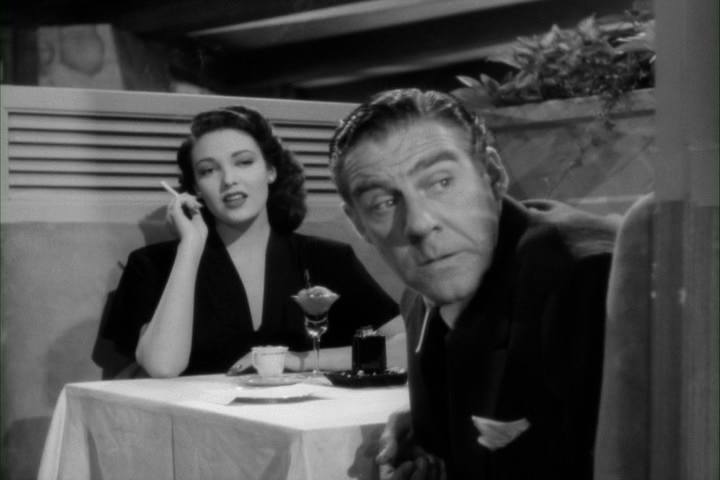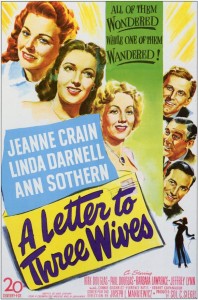|
Genres, Themes, Actors, and Directors:
- Ann Sothern Films
- Celeste Holm Films
- Feminism and Women’s Issues
- Flashback Films
- Infidelity
- Jeanne Crain Films
- Joseph L. Mankiewicz Films
- Kirk Douglas Films
- Linda Darnell Films
- Marital Problems
- Paul Douglas Films
Response to Peary’s Review:
Peary writes that this “sharp-edged yet ultimately sentimental look at three marriages in a small American town” — co-written and directed by Joseph L. Mankiewicz — is “stagy, almost like three one-act plays put together” but “perceptive” and possesses a “literate, Oscar-winning script” which makes us “care about the characters” (who, he argues, “would be ideal as the initial characters in a TV soap”). We’re kept in suspense from beginning to end as we wonder which of their three husbands will turn out to be the adulterer who has run away with the unseen yet seductively voiced “Addie Ross”. The film’s three flashback vignettes each provide a glimpse into unique marital challenges of the era: former-WAVE Crain is insecure about transitioning from her pre-war life on a farm to her new role as a socialite wife; Sothern worries that her work as a successful radio writer may be threatening her cultured husband’s sense of masculinity; and Darnell reflects on the seductive wiles she used to climb the social ladder and snare her boss as her husband.
As in Mankiewicz’s next two movies — All About Eve (1950) and People Will Talk (1951) — A Letter to Three Wives not only features strong female protagonists but directly addresses feminist issues (work, identity, marital insecurity) not commonly on display in other films of the era. It’s notable that while Sothern is the overworked mother of twins, we never see them; the focus is entirely on her role as a writer painfully aware of how her success is impacting her marriage. The most intriguing storyline, however, is that between Darnell and Douglas: co-screenwriters Mankiewicz and Vera Caspary pull no punches in their depiction of a beautiful woman all-too-aware of the games played between men-of-means and working-class women, and how carefully Darnell must lure Douglas into marrying her in order to bed her. Collectively the three wives’ stories tell a fascinating tale of post-war lives for (white) American women.
Note: This film is also noteworthy for providing uncredited Thelma Ritter with one of her first post-Miracle on 34th Street (1947) wisecracking sidekick roles.
Redeeming Qualities and Moments:
- Linda Darnell and Paul Douglas as Lora Mae and Porter Hollingsway

- A witty, suspenseful script
- Creative use of sound
Must See?
Yes, as an enjoyable mid-century classic.
Categories
Links:
|


One thought on “Letter to Three Wives, A (1949)”
A very tentative once-must, for its place in cinema history. There are those who see something in it that (apparently) I just don’t see.
~because I don’t like this movie, never have. And a revisit hasn’t helped me like it more. But that’s aside from the few elements that I do like:
– Kirk Douglas’ rant about the manipulation of radio programming and its intent to make you a ‘better’ person than you are (by way of buying products).
– Thelma Ritter’s performance. Ritter does dependably well with the little she’s given. She has some good, sharp lines. Not enough, but some good ones.
– The structure of the film’s wrap-up of its ‘suspense’. That’s handled well (even if I’m not thrilled with much of the dialogue).
Overall, the script’s dialogue is off-putting to me. For the sake of ‘sophistication’, the language level is heightened…often in a way that runs against the grain of what would be everyday conversation. A lot of things are said in a long-winded way that could very well be more effective (and even wittier) if shorter.
It seems that many gay men love this movie. At YouTube, in the Steve Hayes series, ‘Tired Old Queen at the Movies’, Hayes enthusiastically calls ‘Letter’ “cute”, “refreshing” and “witty as hell”. All of that really escapes me. (If only it were “witty”, with more of the genuinely biting wit found in ‘All About Eve’.) Maybe a lot of gay men like the brittle quality quality that comes from the female characters. I get that – and I like a brittle quality often as well – just not as done here. What’s on display is certainly abrasive…just not very funny.
Essentially, I don’t think I ‘get’ the three married couples and their particular blends of ‘the battle of the sexes’. To me, they all seem to suffer too much from bad communication skills. Granted, couples sometimes fight (and conflict is necessary for drama) – still, the way it all plays out unnerves me. I don’t really find it much of a surprise that the Addie Ross character would run off with one of the men.